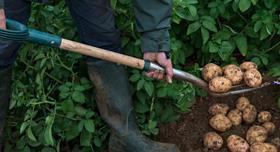
Tesco is to begin selling unwashed potatoes in a move it says will help cut down on food waste and potentially double shelf life.
Back in the 1970s UK supermarkets and greengrocers regularly sold unwashed potatoes on the understanding that leaving soil on them would help block out light and slow down their natural decay. Tesco now wants to return to that formula in a bid to address what WRAP says is the single most wasted food in stores.
The supermarket recently ran an initial trial of selling organic white potatoes across 120 stores, and said that it is now extending the move to 262 stores after receiving positive feedback. The trial is being run in partnership with its major potato supplier Branston.
Tesco Produce lead technical manager Rob Hooper said: “Up until about 50 years ago potatoes would generally be sold unwashed and having a natural film of soil around them would help keep them fresher for longer. But towards the end of the 1970s, supermarkets and greengrocers in general moved towards selling more cosmetically perfect produce and as a result, potatoes were washed before being put out on display.
“Last November we ran an initial trial at stores in Bristol and the surrounding areas to see how shoppers would respond and it was a success, so now we are widening this trial across the south of England.”
In trials so far Tesco and Branston reported that shelf life for the unwashed potatoes nearly doubled, offering up to an extra five days freshness. Explaining the process, the retailer said that when potatoes are exposed to light, chlorophyll forms within its cells which gradually turns its skin green. Chlorophyll is the natural green pigment found in plant leaves and stems and is used along with sunlight energy to generate nutrients needed for growth.
Branston technical manager Dominic Groom explained: ''Working in partnership with Tesco, we identified a potential opportunity to extend the shelf life of our organic potatoes by leaving them unwashed. Soil coverage can offer a layer of protection from the impact light can have on the skin turning green, which is a factor we consider when determining shelf life.
“This trial should provide us with a clearer understanding of how this impact manifests and how customers feel about soil on their potatoes.”
Will McManus, WRAP's sector specialist for fresh produce, said: “One of the biggest drivers of potato waste in the home is that we don’t use them in time, so anything that we can do to extend shelf life has the potential to be really important in the fight against food waste.
“We are very pleased to see how Tesco are collaborating with their suppliers to tackle food waste and bring change to their shelves. Wasting household food makes a huge contribution to global emissions, with 70 per cent of food waste (post-farm gate) coming from the home.”



